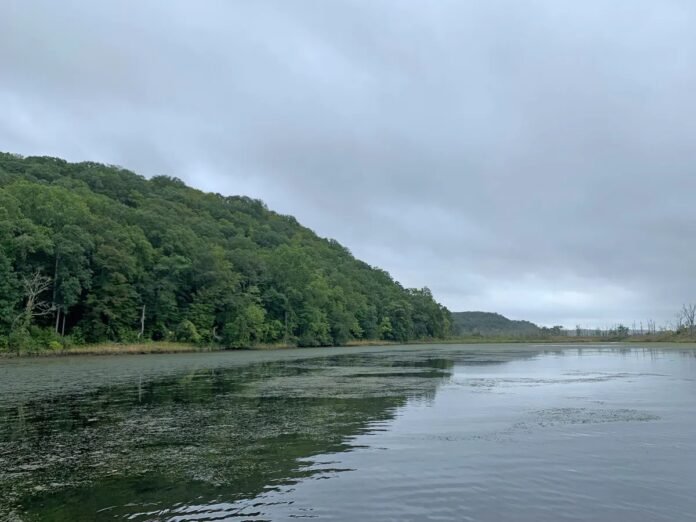


When the noise of social media drowns out science, the environment suffers. And that is exactly what’s happening in Connecticut right now. Rapper and social media influencer Chris Webby is using fear to rally opposition to diquat dibromide, an herbicide being used to control the spread of invasive Hydrilla in the Connecticut River.
Hydrilla is a serious environmental and economic threat, destroying native aquatic life, disrupting ecosystems, clogging waterways, and taking an enormous toll on the state’s boating industry, property values, and, consequently, municipal funds.
Webby, a self-proclaimed conspiracy theorist, has been using his media platform to convince people that the scientists, environmental advocates, state officials, and Connecticut’s federal delegation are part of a plot to harm our waterways for financial gain. Nothing could be further from the truth. (Can’t help but point out the irony of Webby’s public support for Donald Trump, who is eliminating funds for environmental protection at all levels.)
Diquat dibromide is, in fact, a dangerous chemical when used incorrectly or in high quantities, just as many helpful chemicals are. Chemotherapy, for example, also contains dangerous chemicals, but it saves lives every day. Are there side effects? Absolutely. But are they as bad as dying? Hardly.
The coordinated response to controlling Hydrilla is not a rushed decision. Rather, it is a thoughtful response built on extensive research and testing, over many years, by people who know what they are doing and who care deeply about water quality.
As a young person, I recognize the power of social media to shift public opinion. (Webby garnered thousands of signatures on a petition to fight the remediation efforts.) But as an environmentalist, I also recognize that influencers like Chris Webby are exploiting these platforms to shape misinformed narratives. Webby apparently never sought information from the leading Connecticut ecologists who have spent years studying and advocating for the river’s health. Instead, he urged his followers to acquire information through the notoriously unreliable ChatGPT, without mentioning the need to follow up on legitimate sources.
I am glad people are engaging with science in any form, but replacing expert consensus with AI and online conspiracies will not solve ecological crises.
Much as we would hope “natural” fixes are always the answer, sometimes a stronger hand is needed. Hydrilla is a highly invasive species that reproduces rapidly — it occupies close to 1,000 acres in the Connecticut River and has been discovered in 10 new waterbodies across Massachusetts and Connecticut in less than two years.
So, we must confront the uncomfortable truth about alternative control methods. Hand-harvesting Hydrilla or using submerged Benthic mats is labor-intensive, costly, and impractical. Even before the widespread federal funding cuts, the resources these methods require simply didn’t exist. And even if Webby’s followers were ready to join the volunteer crews of the state’s hardworking environmental advocacy organizations and dive in, wade in, swim out, and pluck this plant from the river over and over, it still would not be humanly possible to control it in this way.
Instead, what we need are scalable and science-based solutions. Scientists at the Connecticut Agricultural Experiment Station’s Office of Aquatic Invasive Species recently responded to the inaccurate claims circulating on social media. They say the decision to use diquat is based on thorough research by scientists and agencies like the US Army Corps of Engineers (USACE) and the Environmental Protection Agency (EPA). Carefully monitoring the application of diquat — after studying the water flow patterns and taking into account the herbicide’s effect on all species of plant and animal life — has shown that native plants remain largely intact and recover once the Hydrilla is controlled. In areas where Hydrilla has been treated, for example, native Elodea and Coontail are flourishing.
In a year where environmental research is being discredited, defunded, and politicized, we must rally behind our experts. The legislation that created the Office of Invasive Species was not reckless or profit-motivated, but an informed response to an ecological and economic emergency. Contrary to Webby’s claim, the public was informed every step of the way. Public hearings were held by the state legislature in 2023 and 2024 to inform and engage citizens. Full documentation about the management plan is available on the USACE website.
To my peers: keep asking questions, demanding transparency, and protecting our beautiful state. I am calling on my generation to trust science and call out the spread of misinformation. Passion without facts isn’t activism — it’s chaos. Let’s stand with science and reject the noise that divides us.
Opinion columnist Barth Keck says the reasoned response to Saturday’s attack on former President Donald Trump was drowned out in no time by misinformation and conspiracy theories all over social media. A more telling example of the urgent need for media literacy would be difficult to find.
Opinion columnist Barth Keck says we shouldn’t expect any substantive solutions to the misinformation problem from social-media platforms, especially when it comes to political information. As the election season gears up, emotionally-charged, fact-challenged posts – the very content that attracts the most clicks – will only increase. The Facebooks, Instagrams, and TikToks of the digital…
Opinion writer Barth Keck makes a case for a media literacy requirement in our schools and suggests our future depends on it.
Opinion writer Barth Keck wishes us all a Happy News Literacy Week! Originated four years ago by the News Literacy Project, this annual observation “underscores the vital role of news literacy in a democracy and provides audiences with the knowledge, tools, and abilities to become more news-literate.”
While TikTok, a treasure trove of misinformation, might be the “new Google” for teenagers, Facebook remains the adults’ go-to source for factual inaccuracies and outright lies – especially when it comes to politics.











